#I really hope this post makes sense
Text
Music (and movies) and queerness in Ted Lasso. Particularly in relation to Ted (and Trent)
I want to start with a line from the show that contains the word music.
“If music be the food of love, play on. Give me excess of it.” Said by Mae to Ted in a scene where a few moments later Trent walks up to him after leaving his date to go talk to him. It’s a quote from the VERY queer Shakespeare play “Twelfth Night”. The line implies that the speaker wants to be fed more, to the point of it making them sick so that they won’t desire, love in this case, anymore. Because he’s unhappily in love with someone who he can’t have (Michelle?). BUT he falls in love with someone else later. And in the context of Ted Lasso, this line just so happens to be said right before they show us that Trent is there. Ted also answers Mae, not by asking if she’s asking him if he wants more but “If that’s your fancy way of asking if I want another one, you guessed right”.Another love?And according to James Lance, it was when he was on his way to film this scene that he found out that Trent is gay and that he is “with that guy” as he himself puts it. A man who has a moustache very similar to Ted’s and wears similar clothes.
(Also, this happens in season 2 episode 7. In season 3, episode 7 Ted talks about the red string/thread of fate myth while Trent wears a red bracelet and they are connected by red several times and season 3, episodes 7 and 11 are connected via “You’ve got Mail”, the opening scene in episode 7 being a “tribute” to the movie, and there are other smaller references. And the team, and Trent, watching the movie in episode 11. AndTrent also wears the bracelet in episode 11, an episode I’ll bring up later in this post).
Now, let us get to the music.
Bruce Springsteen
If you google “Bruce Springsteen queer” you get a lot of results discussing queerness in his songs and so on, so to put him in this post is a must.
Bruce Springsteen is brought up by Dottie in season 3 episode 11. She tells Trent about the time Ted got onstage and danced with Bruce Springsteen (which turns out to be a lie) but the connection to Springsteen is still there, because Ted did get onstage with a Bruce Springsteen cover band and sang with them. So, we’ve established a connection between Ted (and Trent) and Bruce Springsteen.
Let’s connect it to something else that happened in the episode. They watch “You’ve Got Mail” starring Tom Hanks and Meg Ryan (I’ll come back to “You’ve Got Mail” later, the important part here is Tom Hanks). Ted states that the superior Nora Ephron/Tom Hanks and Meg Ryan movie is “Sleepless in Seattle”,a movie about a reporter falling for a single dad simply because of the way he talks about things and what he talks about. He brings the movie up twice, once to say that it’s superior and once telling someone to watch it. Now what does “Sleepless in Seattle” have to do with Bruce Springsteen? “Sleepless in Seattle” came out in 1993, as did “Philadelphia” a movie about a gay man played by Tom Hanks. Springsteen made a song called “Streets of Philadelphia”, specifically for this movie. A bit farfetched? Eh, perhaps, but I’m including it anyway.
So, in this episode Trent, a gay man, is told by Ted’s mum that Ted once went onstage with Bruce Springsteen and that’s the story he needs to confirm straight away. He practically skips towards Ted’s office to ask about it. Why that story? Surely she told him about other things too. And he heard the stories she told the team. But this was the story he was excited to get confirmed. A story about Ted’s connection to an artist that has several queer connections and who can also be connected to something else that is brought up in the episode.
Queen
Let’s get the obvious out of the way. Their lead singer was queer.
And I talked about Fat Bottomed Girls and Queen/Freddie/Brian in THIS post. And I talk a little bit about the connection between Ted and Freddie Mercury in THIS post.
Queen has been used a lot throughout “Ted Lasso”, a lot more than I remembered. When I went back to look at the soundtrack for season 1 and 2, I found quite a few Queen songs. I also discovered that two of the trailers for season 2 had Queen songs in the background. “Under Pressure” (which also features David Bowie, another queer artist) and “We Will Rock You”.
Ted talks about having watched Queen at Live Aid on TV when he was younger, in season 2, episode 8 (that episode is called “Man City”, Ted mentions both Queen and Freddie Mercury. Season 3 episode 11 is called “Mom City” and Freddie Mercury is brought up again and a Queen song plays.)
“Tear It Up” plays in season 2, episode 2
“We Are the Champions” plays in season 2, episode 9
“Fat Bottomed Girls” are both mentioned and played in season 3, episode 11
And, while not a Queen song, “Fought & Lost” by Sam Ryder featuring Brian May is also played in season 3, episode 11.
But let’s focus on “Fat Bottomed Girls”. Now, I’ve already talked about it in THIS post, that I also linked above. So, I won’t go over all that again. But a little recap, “Fat Bottomed Girls” is linked to “Bicycle Race” which is sometimes seen as a metaphor for being bi. They were both on the same single and they reference each other. The song is brought up by Higgins when he tells Keeley and Rebecca that Freddie, when he briefly owned Richmond in 1980, tried to make that song Richmond’s song but that it didn’t work. Rebecca then brings up that her dad went to art school with Freddie and that according to him if you would have asked Freddie what his greatest talent was, he would have said “flipping straights”.
We’ve already established Ted’s connection to Queen. And we’ve heard Ted refer to himself as straight just a few episodes ago (episode 7, and I’ve already pointed out the connection between episodes 7 and 11, this is another connection) now we get to hear Rebecca say that Freddie Mercury’s biggest talent was “flipping straights”. Ted is, as far as I know, and I’ve checked, the only person who refers to himself as straight, in the whole show. Not a single other character does that. Once in the Christmas special, once in season 3, episode 7, that’s two times. Will the rule of three apply here? Will he say that he’s straight a third time or will he subvert expectations or if you will, flip the script and say that he’s something else?
Dolly Parton
Trent has worn a Dolly Parton shirt twice. Dolly Parton is a queer icon. In season 3, episode 11 Beard feels the need to call dibs on Dolly’s part in “Islands in the Stream” at karaoke. Implying that Ted perhaps snags that part for himself a lot of the time. Ted then walks away singing “Islands in the Stream”. Yet another queer connection between Trent and Ted via music.
Harry Nilsson/ (Judy Garland)
Back to “You’ve got Mail”. The last scene of “You’ve got mail” ends with Tom Hanks and Meg Ryan meeting up and they kiss while Harry Nilsson’s cover of “Somewhere over the Rainbow” plays in the background. We’re shown that scene, not just by witnessing the characters watching it, but by it filling our own screen for a while. “Somewhere over the Rainbow” is of course from “The Wizard of Oz” originally, sung by Judy Garland. A queer icon. The connection to “The Wizard of Oz” and Ted Lasso has been brought up before. But in this episode, it’s very front and centre. Ted is standing at “The Wizard of Oz” pinball machine, staring at the spinning house. And of course, Ted’s connection to Kansas is always there. And it’s brought up in a very important way this episode, with his mother more or less telling him he should go home to Kansas.
So, we have a well-established connection between Ted and Kansas and “The Wizard of Oz”. Let’s talk more about Judy Garland, Dorothy, the original singer of “Somewhere over the Rainbow”. As I mentioned above, Judy Garland was and is a queer icon. And “The Wizard of Oz” was and is a big part of the queer community. Then we have the “Friend of Dorothy” euphemism, a way to recognise other queer people, and it’s strongly associated with Judy Garland’s Dorothy. In episode 11 we are introduced to Ted’s mother, Dottie, which is a nickname/shortening of Dorothy. Another very clear queer connection to Ted.
And let us also look at James Lance who has said that there is a story arc for Trent’s shirts. And he wore a t-shirt with Dorothy’s ruby slippers to an event that is connected to Ted Lasso. And when asked why he was wearing that shirt, why he chose to honour Dorothy. It feels like he’s deflecting when he says “Well, every good character’s got to have a good pair of shoes, right. And these are surely, surely,the best pair of shoes in showbiz. So, you know, they get their own t-shirt. There aren’t many shoes to do that.” That’s suspicious. And we now know that James has had a lot of input into Trent’s costume, with him suggesting things and getting a thumbs up a lot of the time. He clearly thinks that clothes are important and can send a message. And he chose to wear a Dorothy shirt to a red carpet. When we now know that the eleventh episode of season three had several heavy references to “The Wizard of Oz”.
And to go back to Harry Nilsson. A song sung by him was on the soundtrack for Midnight Cowboy, starring Dustin Hoffman and Jon Voight, a queer movie. (And let’s remember that Trent himself said that Dustin Hoffman would probably play him in a movie).
Honourable mention
Mumford & Sons/Marcus Mumford
Why would I add Mumford & Sons and Marcus Mumford? Because Marcus Mumford made the theme song to Ted Lasso and the instrumental songs for the soundtrack, they’ve also used both Mumford & Sons and Marcus Mumford songs in the show. And the band have a connection to Jason Sudeikis. He was in the official music video for Mumford & Sons’ song “Hopeless Wanderer”, inthat video he clearly plays a version of Marcus, and he kisses another man in it. I think that deserves an honourable mention.
So, to sum it all up, there is queer subtext in the music and the artists that they mention and play in Ted Lasso, and these are just the ones that I personally can connect to Ted (and Ted/Trent). I don’t know if it is a coincidence, but I feel like there is way too much to just be a coincidence. To borrow part of Trent’s line “Through thousands of imperceptible moments, all leading to their inevitable conclusion.” Number four, that doesn’t even matter (but it actually does), LOVE. Queer love.
#ted lasso#ted lasso spoilers#tedependent#trent crimm#ted/trent#ted x trent#nicole watches stuff#I really hope this post makes sense#this post can be summed up with the words:#started making it had a breakdown... bon appétit#I'm sorry to say that I've literally gone insane#just look at this post#I didn't even mean to make this post#I was just going to make a little gifset about the times they've had Queen in the episodes#because I'm a fan of Queen#and then I fell down the rabbit hole#and I ended up with this#and then I thought hey let's go out with a bang you know#if it truly is the last ever episode of ted lasso next week then let's have some fun#the more I looked the more everything connected#like the things that happen in season 2 and 3 episode 7#also discovered that in one of the trailers for season 2 they have a shot of trent smiling at ted in the press room#a shot that isn't in the episode#so yeah... um...#I went deep#I really hope you all get some enjoyment out of this post#I put more effort into this post than I did when I tried (and failed) to write a researched paper at uni (that paper made me drop out again
139 notes
·
View notes
Text
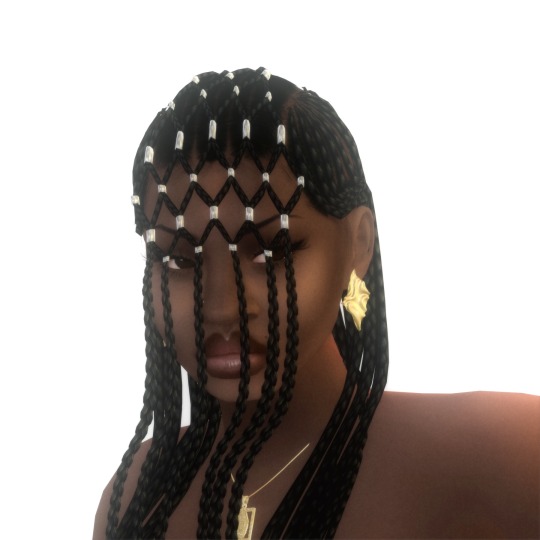
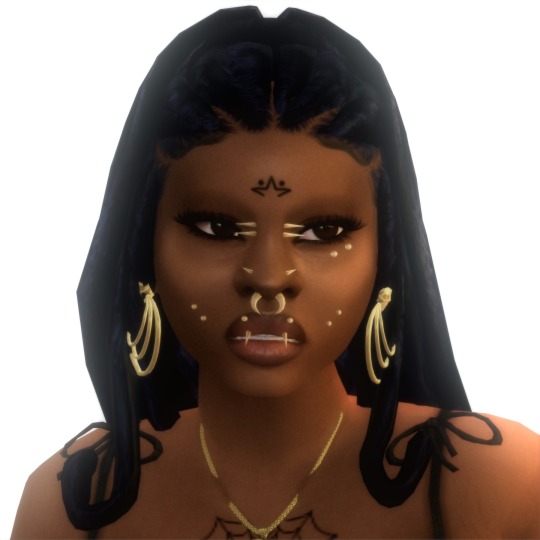
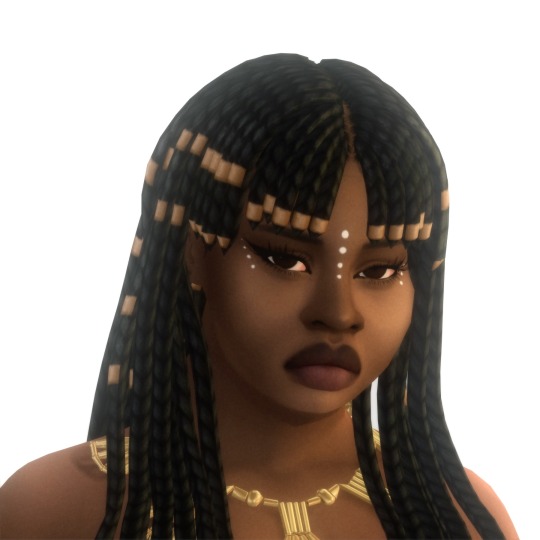
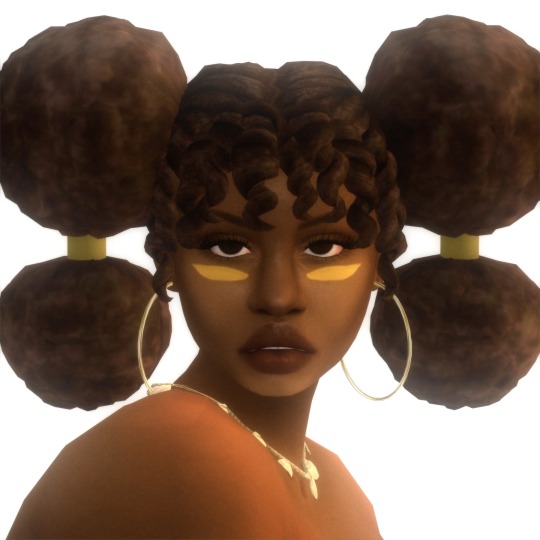
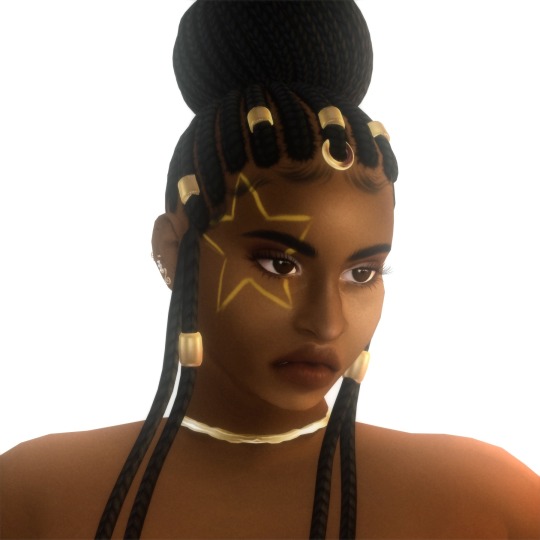
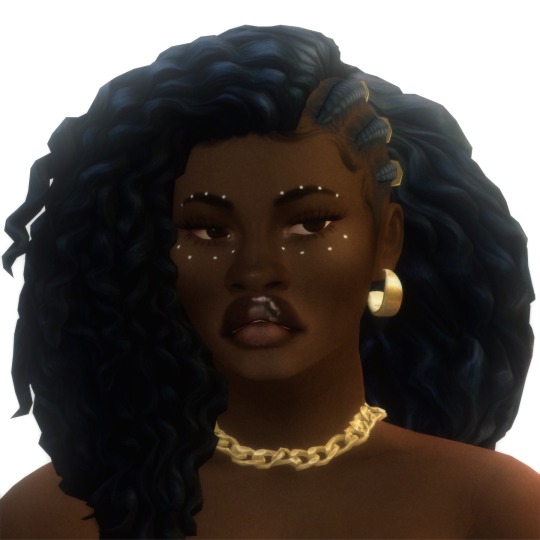
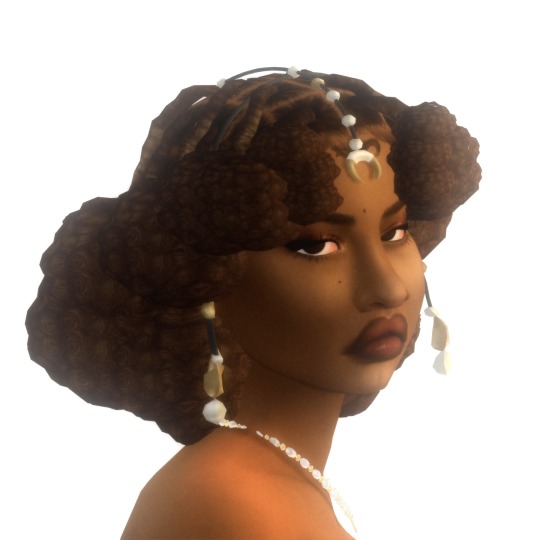
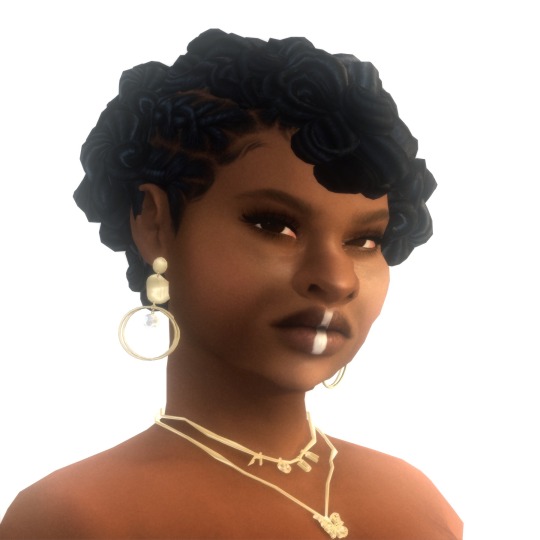
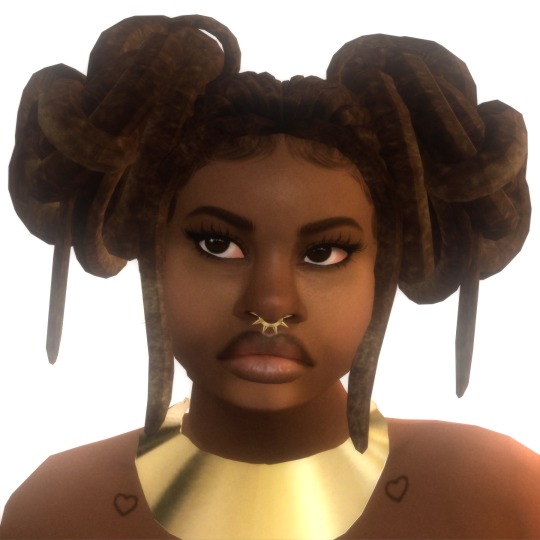
afrofuturism🪐
☆ one ~ solange hair by darknightt (tsr warning) ☆ two ~ loretta hair by @simtric ☆ three ~ bahati braids by @sheabuttyr ☆ four ~ isonoe hair by octetsica ☆ five ~ binah braids by @sheabuttyr ☆ six ~ cornrows & curls hair by @leeleesims1 ☆ seven ~ indie hair by @sashima ☆ eight ~ loc petals by @shespeakssimlish ☆ nine ~ mnemosyne hair by octetsica ☆
mini dedication essay to black simmers and ts4 creators below! pls read if you have the chance! <3
this edit is a small homage to afrofuturism and the various unique black hairstyles (and especially the black creators of most of these hairs) that i have downloaded and admired over the years! some of these are old and some of these are new.
to me, afrofuturism means constantly honoring/reclaiming/challenging the past while constantly creating/dreaming of a better society/world/future. a society/world/future that embraces and empowers all of our differences, ingenuity, aspirations, and unique lived/cultural experiences. a society/world/future that does not limit us through the various systems of marginalization and oppression (racism, homophobia, transphobia, fatphobia, sexism, xenophobia, ableism, classism, colorism, etc.) that often affects how we, as black people, live today.
blackness is so diverse and intricate yet it's always been a struggle to find my culture within a game that's known for being so limiting, bland, and extremely eurocentric when it comes to hairstyles, clothing, food traditions/events, etc. black simmers have always had to figure out how to make this game more inclusive and make it resemble either more like how our ancestors lived, how our current lives are, or how we would want our lives (and even our children's lives) to look like in the future no matter how dystopian the real world look and feel now. fortunately, these hairs and their uniqueness bring a huge sense of culture and style to this game. they have always inspired me and made me feel extremely proud to a part of the lovely african diaspora (and the ever-growing black simmer community).
in a way, being a black simmer and cc creator usually means that we are often digitally creating our own worlds as afrofuturists to varying degrees (whether we know it or not) every time we open our game, make our sims, make houses, and/or make black cultural cc. also, now i know that cc making is not easy to do and is extremely time-consuming so this post is also just me giving all black cc creators especially those who create for free their well-deserved flowers! here are some other black cc creators who created cc that have greatly impacted my game since i first started playing sims 4: @/leeleesims1 @/simtric @/hi-land @/yuyulie @/sims4bradshaw @/ebonixsims @/xmiramira @/sheabuttyr @/qwertysims @/oplerims @/sleepingsims @/shespeakssimlish and so many more im forgetting probably (im too shy rn to tag ppl but i greatly appreciate y’all fr i hope y’all telepathically get this message somehow 😭).
last but not least, i am hoping that this inspires somebody to keep creating or start creating regardless of what they think their skill level is! somebody will absolutely fall in love with your work and/or your art/work will 100% change someone's game forever <333
#ts4#sims 4#the sims 4#black simblr#black simmer#ts4 edit#🪐#🪐 black hair#soleil jones#xolani souza de oliveira#angela evans#leona morrison#chantelle diang#ayesha solomon#nylah rivers#nykhor chantelle diang#something to end black history month with!#i really hope my essay make sense 😭😭😭#i planned to this last year but hated the pictures i took so i scraped it and redid it#i couldn’t thank enough to all the black cc creators before me and hope to help/inspire new black cc creators 🙏🏾#this is also kinda the updated version of my for the culture post…i made sure to include some familiar (but updated) faces 😭☝🏾💗🙈
769 notes
·
View notes
Text
I don't think a lot of people realize that lot of their advice to disabled people often boils down to "Get over it." they are trying to be helpful but their idea of helpful is "Just do the thing" because that's what they do. for them they just do things. It comes naturally to just do it.
They don't know how to bridge the gap between you and the task. For them the bridge is already pre-built and stable. For disabled people the bridge is run down, not well kept, it feels unsteady and is hard to get across without being slow and cautious - hell for some people there is no bridge and we need to build it ourselves but we don't have the bridge building tools and no one gives them to us.
"Just cross the bridge." They say before walking over their pre-built bridge. They never gave you the tools to build a bridge to cross.
#text#I hope this makes sense#disabled#neurodivergent#adhd#actually adhd#actuallyadhd#idk how to tag this post really i dont post a lot in disabled spaces...#by disability i mean all disabilities btw#i suffer from ADHD and chronic pain ad many other things#and all of them cause me problems that make it hard to 'just do it'#so hearing 'advice' that is just 'do the thing you're struggle to do' really gets on my nerves#especially when the people giving that 'advice' throw a hissy fit when i say that its unhelpful
933 notes
·
View notes
Text

number #1 tactic that people use to not sound as racist as they are when they talk to black people: 'uhh so you AMERICANS need to stop pretending everything is about YOU. why should i know this im not from the us :/' (= is talking about like. a phenomenally internationally well-known black artist)
#myposts#kendrick lamar#drake#i updated it from 'white europeans' to 'people' because some people pointed out that 'gringo' is probably more south american lingo#but the point i wanted to make is like. there is this subset of european people (quite a lot of them)#who try to deflect by saying them not knowing these things isn't because of an active lack of disinterest in black culture and influences#and like. them not knowing who a certain black person is is never an educational failing on their side of any sorts#but instead are pretending that like. they are by virtue of being european always correctly educated on What History And Art Is Important#like. 2 months back that one post pretending that 'us europeans dont need to know all your AMERICAN writers 🙄' talking about james baldwin?#like just because that person didnt know who james baldwin was#they immediately were mad at the implication that They Didn't Know Someone Of Cultural Significance#and twisted it into 'well he cant be that important by virtue of me not knowing him'#like completely ignoring that the european school system also has. race problems and also ignoring that he lived and wrote in France too#but like. its this really racist defence mechanism of like. 'well you stupid americans always make everything about yourselves'#i hope i make sense i didnt think this would blow up lol#and like some people in the notes of that post were so smug about not knowing who Kendrick Lamar is#bc to them thats like 'oh im too cultured to be listening to rap of any sorts' like completely dismissing his music as kind of second class#by virtue of it being rap and black music and him not being in the White Mainstream as much as other musicians#(i mean hes still like 24th most listened artist worldwide but you get what i mean)
165 notes
·
View notes
Text
enbarr, sometime in 1186:
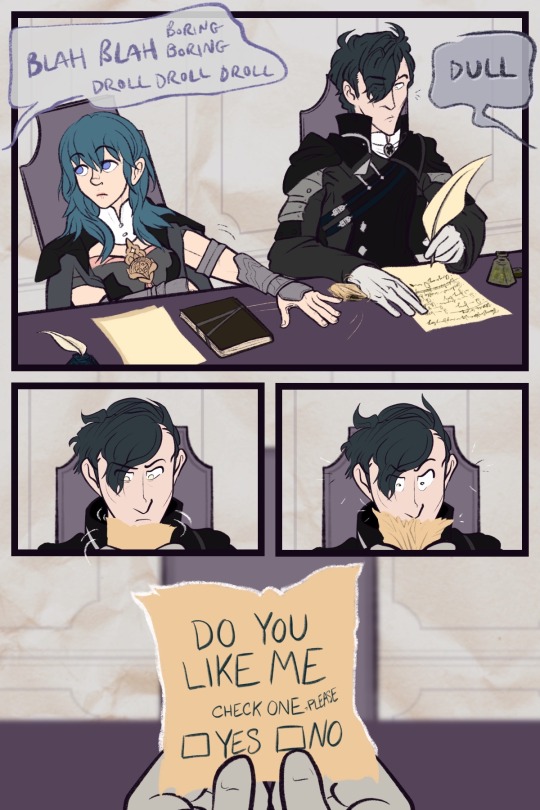
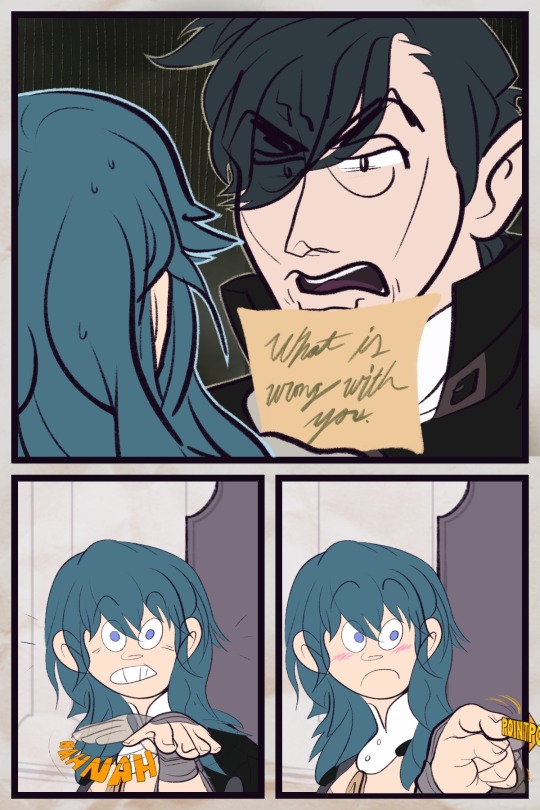
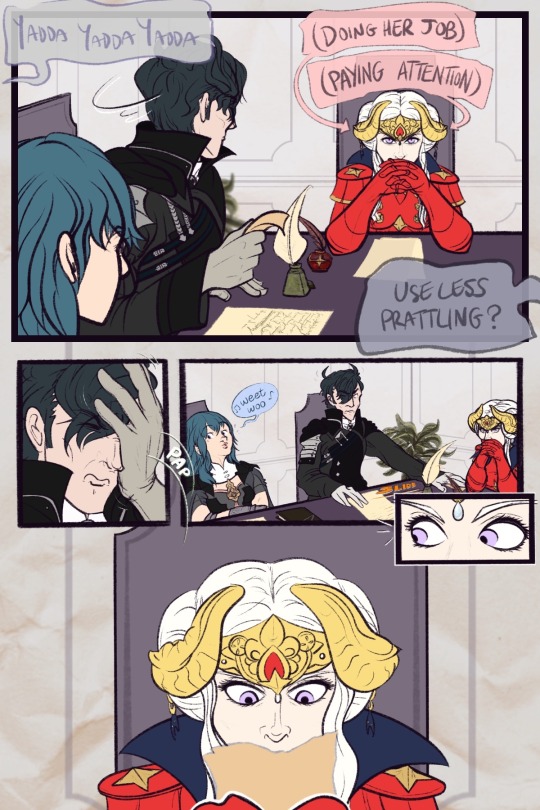
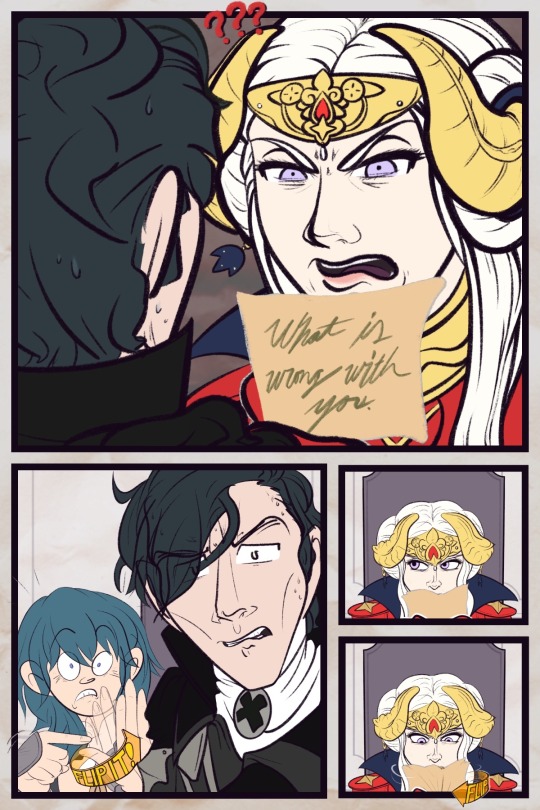
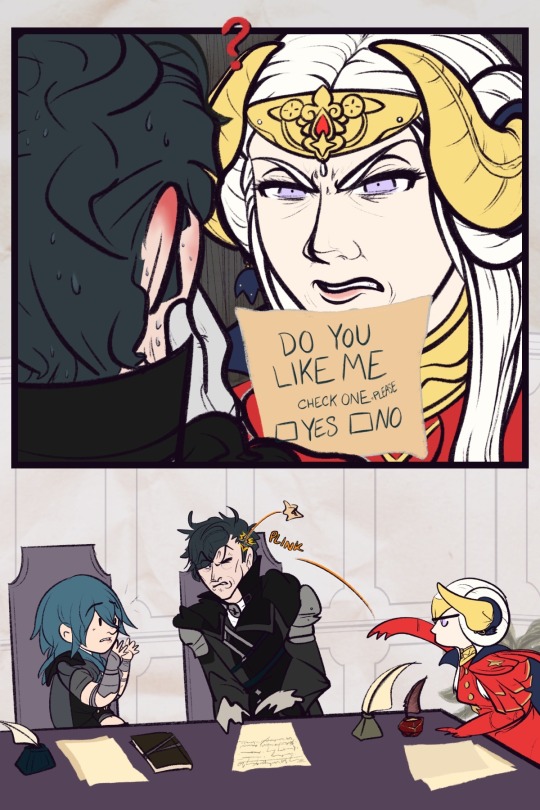
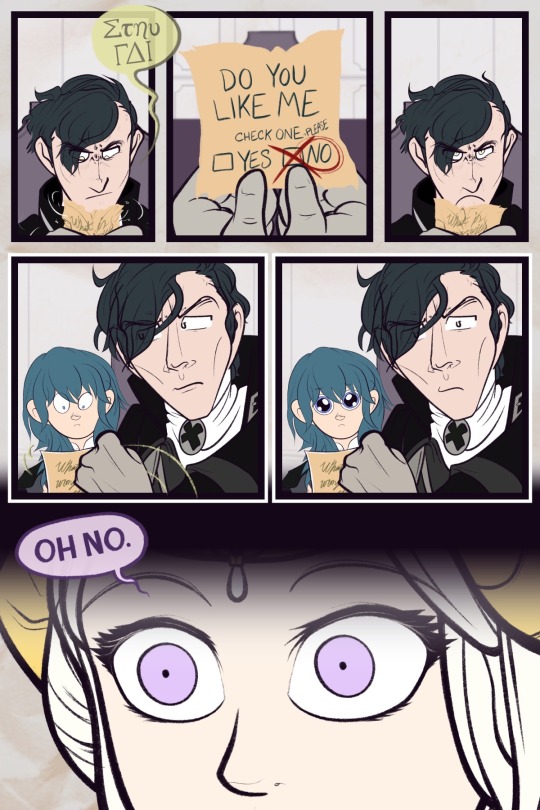
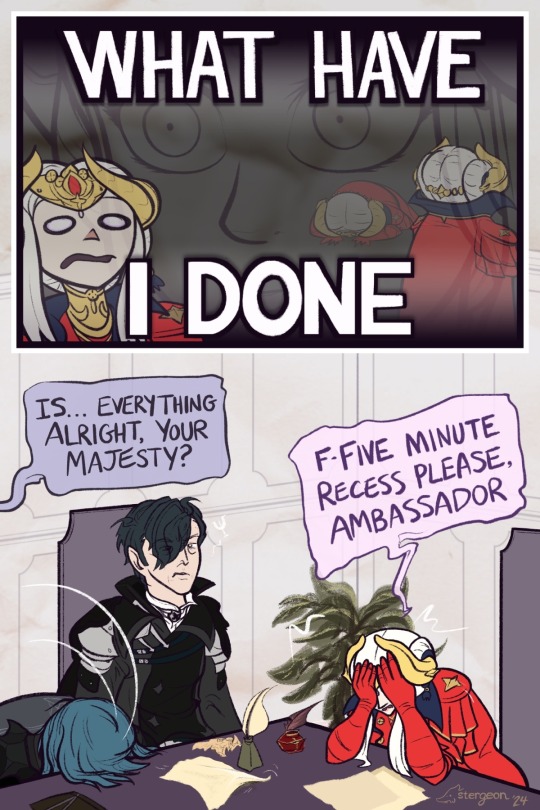
ok so @frozenartscapes made this addition to my post about byleth and edelgard writing each other letters all the time, right:
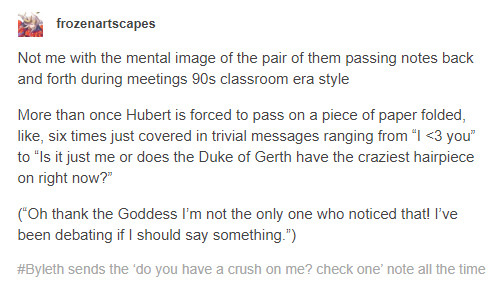
well i kind of lost my mind and now we're here.
i'm sure this meeting is salvageable :0) hubert's sanity, however,
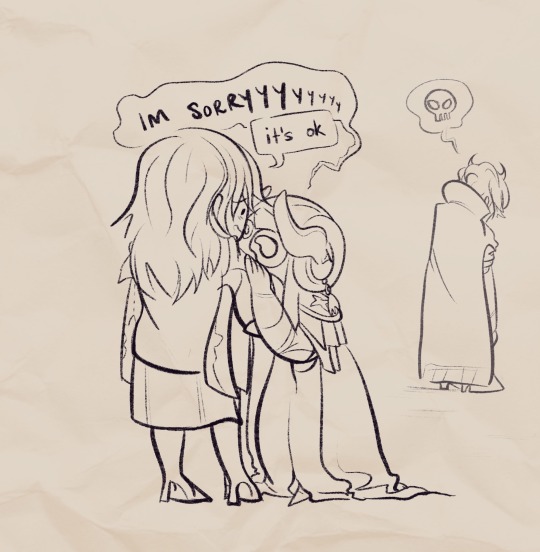
#fire emblem#fe3h#fire emblem three houses#fe16#edeleth#byleth eisner#edelgard von hresvelg#edelgard#byleth x edelgard#three houses#sterge.pptx#long post warning#haven't drawn comics in a good while lol#i guess it's good practice for hourly comic day this week#really hope this makes any sense and is remotely legible#i have yet to figure out how to get stuff to look half-decent when shrunk down for tumblr#boy i sure am glad i gave byleth emotions in my fic so i can have her make the dumbest expressions known to mankind#my half-baked Lore Reason is that she's not used to using her facial muscles yet so every expression is Extreme#there's no justification for why edelgard is like this. it's just funny#yeah it's all ooc but i'm a dyke with a pencil and i can do whatever i want
323 notes
·
View notes
Note
Different anon. FGM is nearly the same to "bottom surgery". It's mutilation based on sex and genitals. The intent doesn't make it any less destructive or sad.
first of all, FGM is not at all nearly the same as bottom surgery, even just from a technical perspective. as many people in the replies of the last ask have pointed out, one difference is that bottom surgery involves the penis being either created from the clitoris or constructed on top of it, not removing it as with many forms of FGM.
but, for the sake of argument, let’s say they are similar surgeries on a technical level. do you really think it’s the kind of surgery that makes FGM bad? would you say that somebody who received a similar surgery for medical reasons was a victim of FGM?
what makes FGM “destructive and sad” is that:
it’s done to people who don’t want it.
it’s done to people who don’t actually know what’s being done to them or what the risks or consequences might be, so victims often find themselves living with complications for the rest of their lives that they never agreed to.
it has many potential harmful effects and no actual benefits.
gender affirming surgeries like bottom surgery don’t match any of those points. they’re:
performed only on people who actively want them and chose to have them done.
only ever done when the patient can give informed consent, meaning they know what the surgery entails and what the risks could be and have chosen to do it with that knowledge.
proven to have mental health benefits for the people who receive them, and are often considered medically necessary on that basis.
fundamentally, bottom surgery is an exercise of bodily autonomy while FGM is a violation of it. that’s what makes FGM so bad and makes the two so vitally different. mutilation is an act that causes serious harm without any true benefit; FGM fits that bill, bottom surgery doesn’t. saying the two are the same is like saying a medically performed abortion is the same as pushing a pregnant person down the stairs to cause a miscarriage: it focuses solely on the most literal understanding of what’s being done without any regard for the details or the impact on the people involved.
the problem with FGM is the fact that it’s being performed on people who can’t give informed consent and who will likely suffer from it while not gaining any benefits from it. if you actually care about victims of FGM, you should be upset about the violation of their bodies and lifelong suffering they’re subjected to, not the fact that it’s their genitals that are being altered.
#i hope this is a good explanation. my knowledge of fgm is admittedly not super in depth but this is my understanding of things#the fact that this came from a post about *top* surgery is honestly hilarious to me bc that’s. a totally different surgery#like y’all will really take any opportunity to shit on bottom surgeries even if it makes no sense huh#examples of transandrophobia#anon hate#transandrophobia#transandromisia#transmisandry#virilmisia#virilphobia#anti transmasculinity#transmascphobia#trans men#transmascs
254 notes
·
View notes
Text
A Quick History of BL
As someone who wrote a thesis on this very subject a few years ago, here is the short version of how BL has evolved throughout the years. For the new comers ❤
a minute of silence for the original form of this post that tumblr decied to not save right after I saved it
I am going to go with a chronological approach. Unfortunately, I cannot put everything in one post so if there’s any questions about this or that aspect of the history of BL that you want to know and it’s not talked about here, you are welcome to ask me directly :)
Context and influences - Japan in the 60′s
Before the US forced Japan to open its borders to the outside world in the 1800s, homosexual practices were common place between budist monks, samurais and kabuki actors. During the Edo period (1600s to 1800s) there was a very rich amount of poetry, art, books (such as Nanshoku Okagami (The Great Mirror of Male Love) by Ihara Saikaku) and codes of conduct about how to have a good master/aprentice relationship, kinda like the greeks if you know what I mean. However, with the arrival of western influences, in order to become a more “civilized” country, it was all put in the closet.
Yet, in the 60′s Japan started to pick it up again through literature about young androginous beautiful boys (aka bishounen). On one hand, in 1961, the novel Koibitotachi no Mori (A Lover’s Forest) by Mari Mori was published. It tells the story of a young and beautiful 19 year old worker and a half french half japanese aristocrat, and their tragic romance. On the other hand, Taruho Inagaki wrote Shounen ai no Bigaku (The esthetics of boy-love), an essay on aesthetic eroticism (of which he wrote a lot of). All this was know as Tanbi (lit. aesthetic) literature. It generally refered to literature with implied homosexuality and homoeroticism such as works by Oscar Wilde, Jean Cocteau, etc. And of course, Mori and Inagaki.
In chinese tanbi is read as danmei (term used to refer to BL novels in china today, ie: The Untamed it’s all connected friends).
From the birth of Shonen Ai to Yaoi - 70′s to the late 80′s
Around the beginning of the 70′s, shoujo was being revolutionized by the Year 24 Group, a generation of women manga authors (mangaka) who started to explore new themes. Among them, their interest in tanbi gave birth to a new subgenre: Shounen ai.
Their most known manga were:
Kaze to Ki no Uta (The Ballad of the Wind and Trees) by Keiko Takemiya, and
Toma no Shinzo (The Heart of Thomas) by Moto Hagio
Their stories are characterized by having suffering eurpoean bishounen in boarding schools, living an idealized perfect love (meaning passionate) that, despite the tragic end of one of them, lives forever in the other.
As this genre starts getting popular, more and more fans of these stories start making their own self published manga, aka doujinshi, of the genre. It is around this time that the term Yaoi is coined. Meaning “YAma nashi, Ochi nashi, Imi nashi” (no climax, no fall, no meaning). Basically PWP fanfiction, for the most part. Doujinshis could be considered an equivalent of fanfiction in manga form. It is also here that the term Fujoshi (aka Rotten Girl, for liking rotten things) starts being used to refer to women readers of yaoi.
With this rise in popularity come the start of the commercialization of the genre. Which meant the publication of magazines dedicated solely to yaoi/shonen ai/BL. The most popular yaoi manga magazine at the time was June. The common trait of their stories being the therapeutic power of the love between the mains. The traumatized character would heal throught this newfound love.
Most of the stories at this time happened in the West (Europe or the States) as the exploration of these dark themes intertwined with homosexual romance and homoeroticism still feel safer to explore as a foreign concept. One example would be Banana Fish (1985).
Commercialization and Yaoi Ronso - 90′s
As more publishing houses pick the genre up, the term Boys Love is used to include every type of manga about homosexuality made for women.
The increasing amount of BL series sees a changes in its themes:
the start of the “gay for you” trope where one mantains their heterosexuality despite being in a homsexual relationship,
the uke/seme dynamic (mirroring hetero realtionships) also relating to physical appearence (one being more feminine, the other being more masculine),
the use of rape as an act love (sexual violence has always been present but here it becomes a staple),
anal sex as the only type of sex,
older and more masculine men start to appear
they now happen in Japan
Good examples of the presence of these themes in manga are Gravitation (1996) or Yatteranneeze (1995).
However in 1992, Masaki Sato (a gay activist/drag queen) wrote a letter in a small scale feminist magazine attacking yaoi and pointing out how it “represented a kind of misappropriation or distortion of gay life that impacted negatively upon Japanese gay men”. The female readers of yaoi responded, defending the genre as a means to escape gender roles and explore sexual themes that was never meant to represent the realities of gay men. This is know as the Yaoi Ronso (Yaoi Debates).
The debate ended with both sides understanding more of each other, with mangakas starting to include queer views in their works. It also started the academic reasearch of BL.
Yet, it is a debate that has been restarted more than once, as it is still relevant despite the evolution of the genre.
more on this on another post
Globalization and coining of BL - 2000′s
By the beginning of the 2000s BL is being sold all over the world (like all manga), and has become a stable industry. We could say it has finally become it’s own genre.
Some of the most well known manga series, to us (in the west), of the time are:
Junjou Romantica 2002
Koi Suru Boukun 2004
Love Pistols 2004
Haru wo Daiteita 1999
all of these have anime adaptations for the curious ones
We also start seeing short anime adaptations or special episodes of the most popular series, with questionable themes, such as: adoptive father x adoptive son (Papa to Kiss in the Dark 2005), father x son’s friend (Kirepapa 2008), etc...
However the themes remain more or less the same. Junjou Romantica’s love story starts with a non-con sex scene by the older one (masc, seme) to the younger one (more feminine, uke) addressed years later in the manga btw. Koi Suru Boukun’s love story is triggered by aphrodisiacs and rape. They’re still very present in the stories but slowly going away. A mangaka that represents this era could be Natsume Isaku (Candy Color Paradox 2010).
Change is slow in Japan. Even though the voices of LGBT+ people started to be taken into account in the genre it is not until later that we see it reflect in the mangas themselves. However, we can already see the start of this in Doukyusei (Classmates) (2006) by Asumiko Nakamura. Also Kinou Nani Tabeta? (2007) which is actually part of a more mature genre: Seinen.
It is my personal (subjective) theory that the BL of this era was the one that got popular outside of Japan, which is why we see lots of references to the themes, tropes and dynamics of this time in today’s BL series.
The LGBTzation of BL and the rise of webtoons - 2010′s to 2020′s
Slowly but surely LGBT characters and themes enter the scene of BL. Existing simultaneously with the previous tropes and themes, we start seeing a shift in these stories. We now see:
characters that identify as gay or some type of queer
discussions about homophobia
more mature themes about life and romance
At the same time as we get the usual love stories with the usual themes, a new trend starts to take over. And we get simultaneously, cute, sometimes questionable but light love stories:
Love Stage 2010
Ashita wa Docchi da! 2011
Kieta Hatsukoi 2019
More profound stories and darker or more complex themes:
Blue Sky Complex 2013
Saezuru Tori wa Habatakanai 2011 (mafias)
Given 2013 (suicide)
Hidamari ga Kikoeru 2013 (deafness)
And others that adress the queer experience in a more mature way (which might actually fall into the Seinen genre)
Itoshi no Nekokke 2010 (slice of life, queer characters)
Smells like Green Spirit 2011 (two ways to deal with a homphobic society)
Strange 2014 (relationships between men)
Shimanami Tasogare 2015 (an LGBT group helps a closeted gay)
Old Fashioned Cupcake 2019 (you know this one 😉)
Bokura no Micro na Shuumatsu 2020 (the end of the world)
As queer stories are explored, BL mangakas and mangakas from other genres start to consider more stories about queer people such as the Josei Genderless Danshi ni Aisaretemasu (My Androgynous Boyfriend) (2018) by Tamekou, or the Shoujo Goukon ni Itarra Onna ga Inakatta Hanashi (The story of when I went to a mixer and there were no women) (2021) by Nana Aokawa.
Still, we can see two realities live side by side. Doukyuusei gets adapted into an impactful animated movie in 2016, meanwhile Banana Fish gets an anime adaptation that keeps the homoeroticism but not the homosexuality.
For those who might be interested. Here are some of the authors that represent the first half of this era, where they start to include newer points of view:
Scarlet Beriko, HAYAKAWA Nojiko, KURAHASHI Tomo, OGERETSU Tanaka, Harada, KII Kanna (Stranger by the Sea), etc...
And authors that while keeping classical themes break the stereotypes in a subtle manner:
CTK, ZAKK, Jyanome, Cocomi, Hidebu Takahashi, SUZUMARU Minta, etc...
Mangakas also no longer stick to one genre only. They explore whichever of them they want, from BL to Seinen to others.
ie: Tamekou,
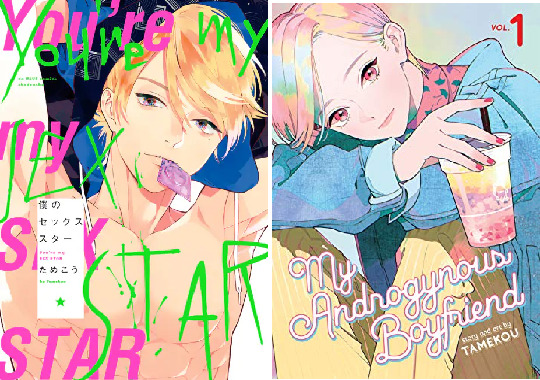
or Asumiko Nakamura

The curious case of Webtoons
With the digitalization of mangas, throught Renta and Lehzin, it has become easier (and more expensive) to access these stories. Korea makes and appearence with their webtoons. Through the lack of piracy protections and the majority of them being digital, manhwa (korean webtoons) sees a rise in popularity. Through the digital medium the influencee can be the influencer.
However, like many other East Asian countries they have consumed BL, without hearing about the conversations about BL. So they end up mantaining the older themes and stereotypes that newer BL is trying to leave behind. Therefore, we end up with a mix of old and new, ie:
Killing Stalking 2016
Cherry Blossoms After Winter 2017
Painter of The Night 2019
Additionally, it is also thanks to the easy access to internet that Omegaverse, with its higher dramatic stakes (that parallel hetero dynamics), enters the mangasphere in 2016. It has grown in popularity ever since.
With the Thai BL Boom of 2020, Japan rediscovers its own BL market and starts investing in it more. Which is why we get live action adaptations of BL manga that was popular years ago (Candy Color Paradox was a manga from 2010), the more recent ones (The End of the World With You) or new anime adaptations (Saezuru Tori wa Habatakanai in 2020).
more on this in my japanese live action BL post
What has it become now? is it BL? ML? or Seinen? Or is it all just gay manga?
It is clear that Shoujo manga (with BL, Josei and Seinen) is exploring queer themes such as gender and sexuality more and more. Japan is interested in this conversation, not only in manga (Genderless fashion). Which brings up the current question in BL studies: Does it make sense to keep these categories?
As a response to BL, ML (Male Love), which is made by gay men for gay men, started happening (around the 70s too). And Bara (gay manga porn) in response to Yaoi. However both gay men and women read BL and ML. We also see other themes being explored through BL, such as friendship (in BL Metamorphose), food (in Kinou Nani Tabeta), male relationships of all kinds (in Strange), and different queer views on life and its challenges (in Shimanami Tasogare). More and more what is LGBT and what is BL is merging, the line is blurred.
Conclusion
BL has been in my life for longer than it hasn't. It is through shoujo and BL that I have come to understand people and romance.
It is flawed, like everything else this life, but it's flourishing in many ways.
The genre feels old and new at the same time.
We can still find shounen ai/tanbi elements in more modern manga (All About J). Or the gay for you in a new light (Itoshi no Nekkoke). Or more educational manga on queer issues (My Brother’s Husband by Gengoroh Tagame). BL has around 50 years of existence but it is also being born anew in Thailand and Korea.
BL manga will continue to evolve in acordance to Japanese tastes, as it is still a local market. Hopefully the korean webtoons that get popular will be the more daring ones in their themes. Who knows where it will go from here? The only thing we know for sure is that it will continue to change. Isn't it exciting?
A post on the evolution of live action BL in Japan is coming, to complement this post. As well as a more detailed explanation of the Yaoi Debates and gay manga.
#history of bl#bl post series#I feel like I left too much stuff out#I hope it makes sense#honestly I would really recommend reading some of those manga#they're super interesting#soon it'll be 20 years since I started reading BL#my gosh#if theres anything anyone wants to know more about#I'd love to write more :)#yaoi manga#bl manga
673 notes
·
View notes
Text
thinking about how eiji's a pole vaulter and how ash talks about eiji "flying" and how eiji's associated with bird imagery and how eiji's free (unlike ash) and how eiji comes in on a plane and leaves on a plane and how ash cannot fly, ash cannot be free, how nyc is ash's prison, and how ash is the leopard who dies climbing the mountain, unable to live at such elevation, how he was trying to reach the sky and be free but was always stuck to the earth, how he chose to die instead of climbing back down, how he chose to die where he could see the sky and hope and freedom almost like a bird with eiji's letter right in front of him rather than letting everything go wrong and ruin it once again, how eiji's a failed pole vaulter anyway, how a bad fall ruined his career and grounded him (physically and emotionally), how it took flying to america and meeting ash and needing to save him and skip for him to try flying again, how he landed hard and harsh and still the thought of that escape compelled ash to protect eiji at all costs because if he could fly that means something to him, even if he doesn't think he can fly, how eiji is the manifestation of his hope and how when he breaks and asks eiji to stay with him a while he folds himself over his legs and weighs him down and traps him and grounds him, how ash fights like hell to keep eiji alive not because he thinks he can be like him (hopeful, flying, innocent), but because he makes him forget the gravity of his situation, and so he can see eiji fly again. how he wants to see him escape. how eiji is a bird and ash is a wildcat and how ash never once saw eiji as prey. how eiji never saw ash as a predator. how it is eiji's naivete that first endears ash to him, how it is his freedom and flight and removal from darkness and his ability to leave that darkness that really roots eiji in ash's blood as something essential to him keeping on living in this hell of nyc. how it is that distance from the violence and that hope for the future that ash chooses to surround himself in as he dies. how ash dies in a dream because he feels more than anything that he can't fly like eiji, that he can never leave. how his violence is a part of him and will be forever, how it weighs him down. how he wants to enjoy the view from the mountainside rather than looking up from the ground below. as if they can both fly. as if he is with him up there and not grounded. eye-to-eye with what he can't have, seeing eiji's homeland: the sky. how he dies trying to reach the top because he couldn't take retreating and trying again. how ash, tired and tired and tired and convinced it will go on forever if he crawls back down the mountain, chooses to close his life deluged in eiji, in eiji's insistence that they can fly together, in eiji's hope for him and for them, in eiji's beautiful dream. how ash dies without trying to realize that dream. how ash, in dying, destroys it.
#banana fish spoilers#I'M HAVING A FUCKING MOMENT#mutual reblogged exactly one (1) piece of ash fanart and sent me on A Multiple Hour Long Thing and now im rewatching it lol#yes i am only on episode 2 yes i am still going to write big long analysis posts ANYWAY#whatever hope this makes sense. anyway#banana fish#okumura eiji#ash lynx#asheiji#hhhhh i can't believe i've only watched this twice in like what 5.5 years?? sheesh#anywayyyyyyy i care about them a lot ok. god#and yes i DO kinda have beef with the decision to kill ash off at the end but it really does say so much About his character#that he chose to die in the way that he did even though he's been throwing his life away since episode 1#dying in peace in comfort in solitude rather than in some chaotic battlefield.... ough...... in the peace eiji alone could give him.....#anywayss i relate to ash a little more than i should so. this one's for us cool guy bottoms up#edit i uh.... i forgot it was a leopard.... in the story..... but whatever it doesn't really affect the symbolic meaning it's just embarras#ing that i forgot >;/
218 notes
·
View notes
Text
I really do know that physical appearance isn’t everything but i also really hope that one day i get to experience someone i love looking at me and thinking i’m pretty
#wlw#wlw mood#sapphic#sapphism#lesbian#idk#i just haven’t really had many compliments on my appearance throughout my life#but the few times i have gotten them have been crazy#i end up thinking about it forever#idk i’m just forever excited about the idea of someone just plain old LIKING me#like bells and whistles of falling in love and everything aside#i truthfully deeply really want someone just to like me if that makes sense#also this isn’t like a sad post btw#it’s something im hopeful about and look forward to a lot :)#right now i just have to be a bit wistful about it though lol#im gay and i like sleeping
226 notes
·
View notes
Text
yes i'm rooting for m*leven breakup because byler is neat but mostly? i'm rooting for m*leven breakup for the sake of el and mike.
to me, their romance was always a puppy love born out of a combination of social pressures, naïve curiosity, and a lack of true understanding regarding intimacy and romantic love and what it really is. it was real in that they do truly, deeply care about each other and they are close friends, maybe even shared an attraction, but a maturing romance is so much more than that. they've grown up and out of being boyfriend/girlfriend, and that's okay! i think television/film needs to show more often that most of us don't have definite "soulmates" or first childhood loves that we spend our whole lives with. it doesn't mean these relationships meant nothing and didn't impact us, it just means they've run their course and that something else is in the cards, and this is part of life!
i've always felt el was at her best and most confident self when broken up with mike, discovering who she was and what she liked alongside another girl her age instead of just relying on mike for mentorship on how to live in the real world. she deserves more of an opportunity to find herself, her autonomy, and her independence, and to love who she is, and she's made it clear she's felt insecure in the relationship with mike because she isn't being loved and understood the way she wants, needs, and deserves from someone who is her partner.
also, it's okay if mike doesn't love her in "the way he should". he is not obligated to love her romantically and stay in a relationship with her just because she's a girl, because she "needed someone", or because he cares about her a lot. he shouldn't be pressured into a romance if it's not truly coming from his heart. he deserves freedom to find out and honour who he is, too, instead of just staying in his non-functional first relationship — one he got into as a child, essentially — and defining himself that way because it's what's expected when a boy and a girl are close. he loves her in some way, yes, but it's okay if he doesn't feel comfortable or secure being her boyfriend anymore, for whatever reason that is. he's felt insecure too, and that's valid and it matters.
they are their own people and are steadily growing and changing every day. they need time to figure out who those people are, and it's become clear (at least in my opinion) that those people aren't meant to be a couple at this stage.
they deserve freedom. they deserve to grow up and be authentic to themselves and not feel like they need to lie for the sake of a relationship. they deserve to move on from this version of their relationship that isn't making them happy and rekindle the best part of their bond: their strong, beautiful friendship. they don't have to be a couple if it doesn't make them stronger and better and happier people.
i think it would be healthy and wonderful for a show, especially one consumed frequently by young adults, to show a relationship starting, progressing, and ending on good terms in this way. sometimes things don't work out, and that is okay.
#eve text#elmike#stranger things#byler#only tagging byler because i feel like yall will like this take lol#tagging tagging tagging WHAT ARE EVERYONE ELSE'S THOUGHTS#god i can't believe i'm making a post about stranger things. this feels like poking a bear#i'm not particularly anti m*leven but like... they'd have to do something pretty special at this point for me to feel like it's viable#i'm seeing the bts of s5 and it's got me Having Thoughts#elmike friendship is something i am so passionate about#even before i ever liked byler (didn't ship at all until s4 even though i knew it was a thing before) i've felt this way about elmike#i always believed they were close friends at heart and needed to break up#the romance part of them felt very distinctly young and very much “he was a boy she was a girl” to me#and it hasn't deepened into anything more mature and i don't see how it could based on the current state of the writing...#the fact that lumax exists — a young relationship that is actively maturing and is healthy — makes that clear to me#and the “love confession” in s4 and how disingenuous and miserable it felt was just the nail in the coffin#also the fact that will (who is IN LOVE with mike) was instrumental in making it happen? ... uh... okay... interesting choice…#fucked up and reductive if they make it another queer unrequited love sacrifice for the sake of pushing the heterosexual agenda YUCK#so i really hope the speculation about a m*leven breakup is real!! i think it just makes sense for their characters but who knows#i don't believe in the notion of love at first sight or one true love and i think the writers don't too???#love to me is an accumulation of experiences and we inevitably choose it at some point rather than fall into it... but idk#tv is so fixated on keeping couples together... sometimes it's just not reality guys especially with young people... LET IT GO...#like i said though i'm not 100% sold that they're going to give up their “golden couple” LMAO#stranger things hasn't historically subverted too many tropes if i'm being honest#anyway i seriously need this season to come out quickly... i'm so bored and getting my master's is crushing my soul#i need frivolity#ALSO btw i won't respond to hateful messages about this so please don't bother. it's not that serious. this is a netflix show
148 notes
·
View notes
Text
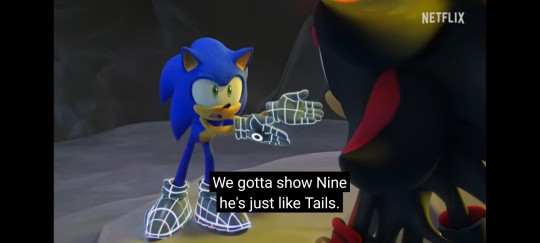
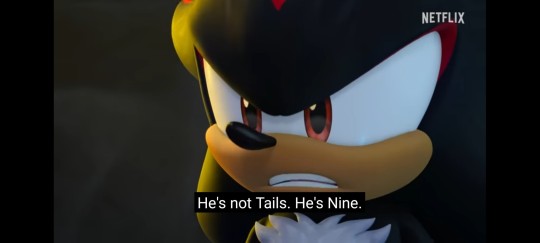
Shadow, despite hating Nine with a passion, is the only person in this entire show that actually sees and understands him in any meaningful way. Sonic's attachment to Nine is based off his friendship with Tails and his inability to cope with the fact that his best friend is gone. In his eyes, Nine is just a gloomy, edgy version of Tails, not his own person with his own motives and desires. He's so used to him and Tails being on the same page, always having each other's back, that he didn't even bother to consider the fact that Nine and him would be any different, and his lapse in judgement is what lead to Ghost Hill being destroyed in the aftermath of Nine's betrayal.
Shadow repeats the sentiment ''they're not your real friends'' over and over in the show. Not only does he offer Sonic a mental out, a way to compartmentalize and stick to their priorities without any regrets weighing him down, it also rings very true to every character Sonic has met thus far. Rebel isn't Rouge, Renegade isn't Knuckles, Thorn isn't Amy and Nine isn't Tails. They're only pieces of their original's personality formed and twisted into their own people with their own lives and their own names. They're similar, but distinctly different, complete strangers in all but appearance. Sonic undoubtably cares about Nine and the others, but that care is built on an illusion, and Shadow recognized that immediately. And for me that's the most ironic and sensible part of it all. That it's Shadow of all people recognizing that so quickly. Shadow, the guy with a history of identity issues plagueing his legacy. Shadow, the guy who cares the least about these other people and made Sonic eat dirt for an entire episode just to sacrifice them one season ago.
And it makes sense. Because he knows first hand how difficult it is to seperate the past from the present, walking the line between being a protector and being a destroyer, his own person or just a weapon and existing as an entity for others to project on until he finally figured himself out on his own, he's able to sniff out Nine's confusion and resentment of Tails from his line ''This is the friend Sonic thought was like me? We're nothing alike'' when they encountered his ghost form before Sonic ever did. And because he doesn't care for him, he never associates him with Tails, giving him the ability to see Nine for who he really is. And Nine's troubled, selfish and volatile, and not to be trusted because his goals never aligned with theirs. He's everything Tails isn't, and that's why Sonic never acknowledged those traits. But Shadow sees Nine, and that's why he was so quick to distrust him.
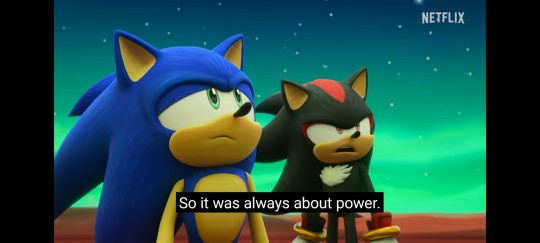
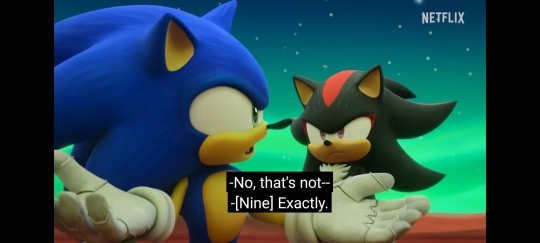
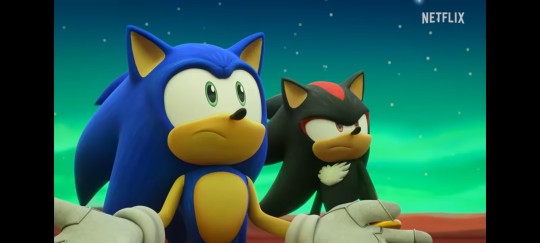
It's also why he could easily deduce what the motive behind his actions were. Power. It's a motive he can certainly relate to. Something he can understand, but Sonic cannot (bless his heart). It was his driving force for the entirety of SA2. What he was after was the power of the Chaos Emeralds to inact Professor Gerald's revenge on the planet and was he believed to be Maria's dying wish, just like how Nine searches for power to create a paradise where he can live the life he always wanted surrounded by ''friends'' he never had. Both of them didn't think about the damage they caused or those they betrayed in that pursuit because they never factored into the equation in the first place. It's about power to achieve self-fulfilment, and what a broken, lonely, destructive and misguided guy seen by nobody and isolated by everybody will do to see it all through to the end.
Nine and Shadow can relate to each other. They can understand each other. They're can be on the same page when it comes to figuring out what the other person is plotting from eye contact alone (like Shadow immediately realising that Nine was going to use Sonic as his energy source). What Shadow wants from Sonic is to be heard, and what Nine wanted from Sonic was to be seen, and what they can't recieve from him they can give to each other. They're similar, they're compatible, they're both attached to Sonic despite acting otherwise and their mindsets are identical-- and that's exactly why they will never be friends.
#sonic prime#sonic prime spoilers#i find shadow and nine's rivalry really neat if that wasn't obvious already#i'm a sucker for characters so similar they're fated to clash and they fit the bill so well it's nuts#shadow acknowledges nine as his own person which is what nine always wanted out of sonic#but because he does unlike sonic he doesn't trust nine further than he can throw him. so nine is stuck regardless#idk i just wanted to rant about these guys real quick hope this post makes sense#nine sonic prime#shadow the hedgehog#sorry for any grammar mistakes!
180 notes
·
View notes
Text
I watched Good Omens for the first time last week, so I'm a bit late to the party, but I wanted to talk a little bit about the Metatron's offer to Aziraphale.
On my initial watch, I definitely got "Azula tricking Zuko to come back to the Fire Nation" vibes and after a few rewatches as well as a refresher on that episode of ATLA, the parallels are even stronger.
First we have the Metatron and Azula:
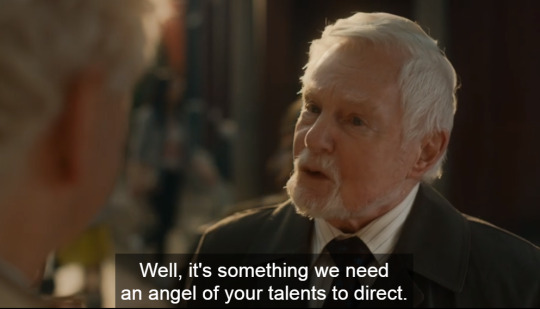
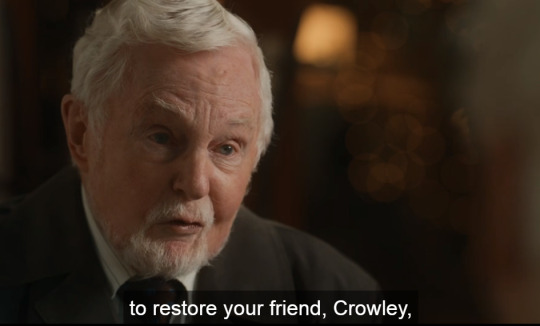

They both show up suddenly with grand promises, telling Aziraphale and Zuko exactly what they want to hear. You can come Home. You can come back to Heaven, and so can Crowley. We need you. We want you.
They both emphasize that they are delivering good news, really hyping it up. They are so kind and understanding. Take all the time you need.
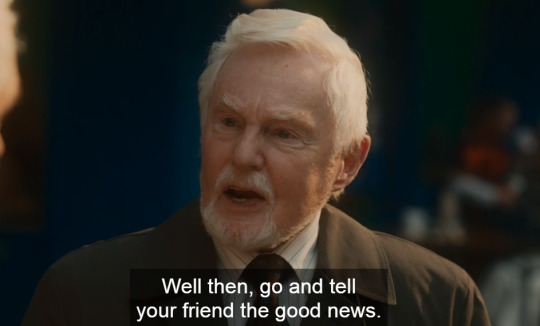
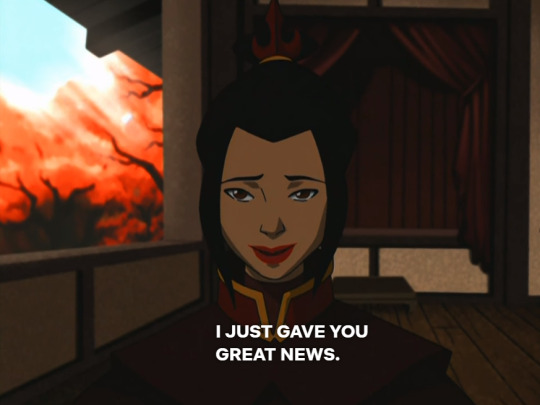

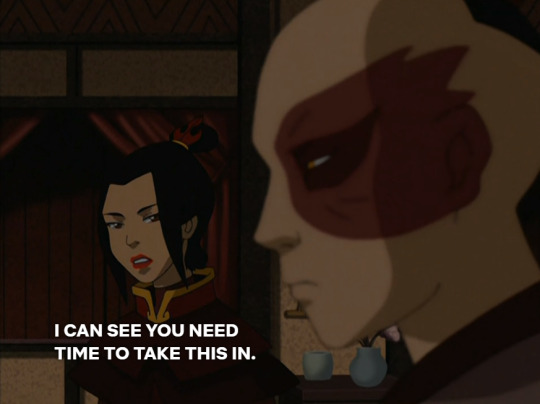
But at the same time that they are warm to their target, they show open disdain to their closest ally when their backs are turned.
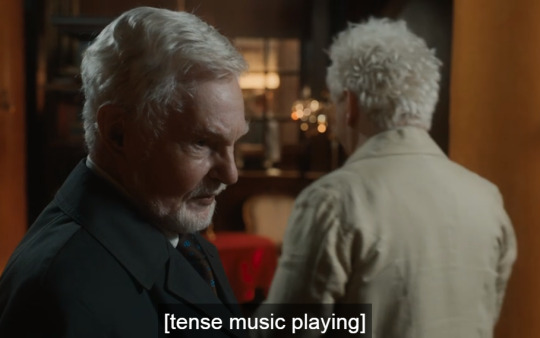

Next, we have Aziraphale and Zuko:
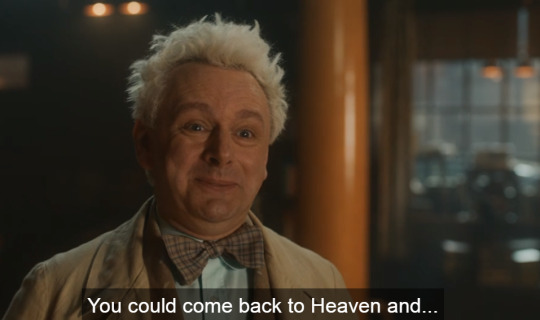

At this point, Zuko still believes in the vision of the Fire Nation, he believes that they are honorable and right in what they do, and Aziraphale believes that Heaven is the epitome of goodness, truth, and light. The word "indoctrination" comes to mind. They've both been burned by the people they look up to, but are blinded by their ideals.
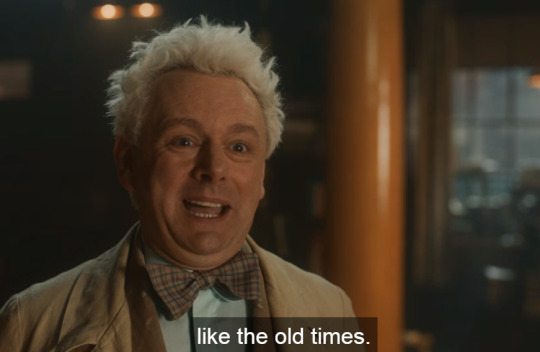

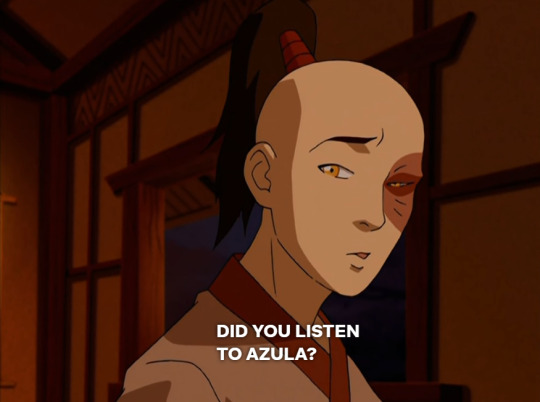
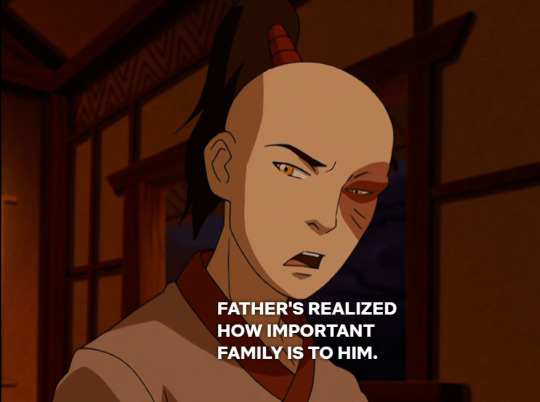
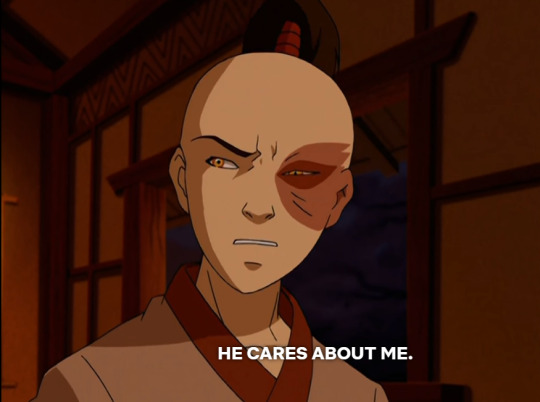
They're extremely loyal to their side, and there's more than a little denial at play. When Crowley and Iroh express distrust and a desire not to go, they get defensive, they lash out. You don't know, you don't understand.
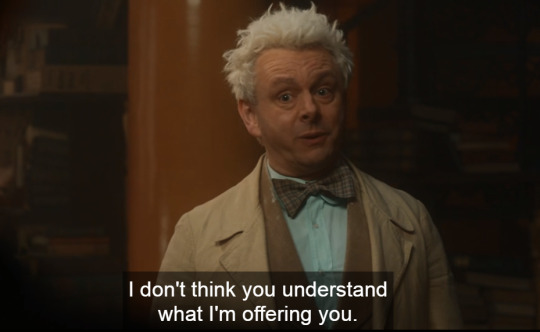
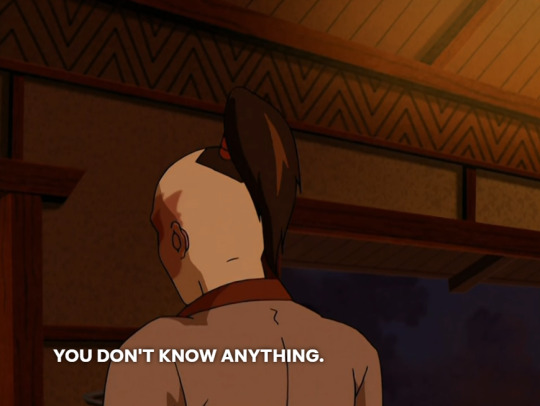
Finally, we have Crowley and Iroh:
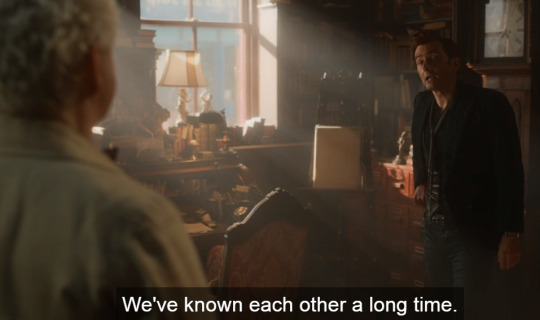
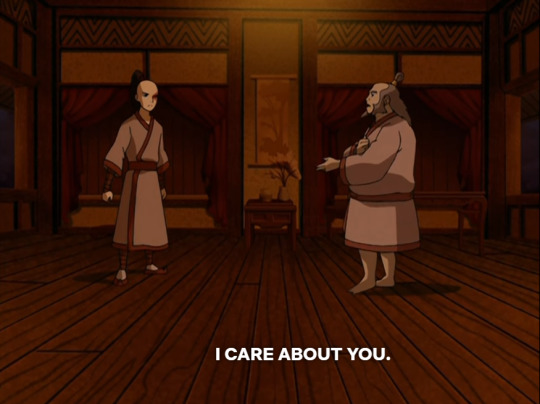
They truly care for Aziraphale and Zuko. They're always there for them and would do just about anything to protect them.
They are a bit more worldly than their companions and are suspicious of the Metatron and Azula's intentions. In our family, things aren't always what they seem. Heaven and Hell are both toxic.
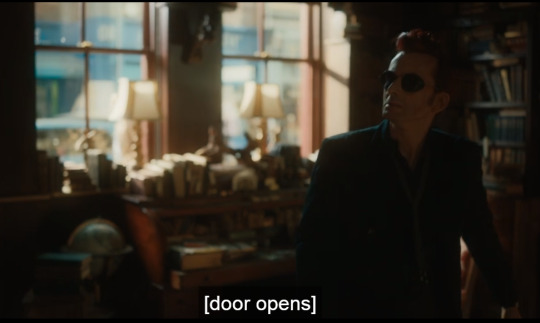
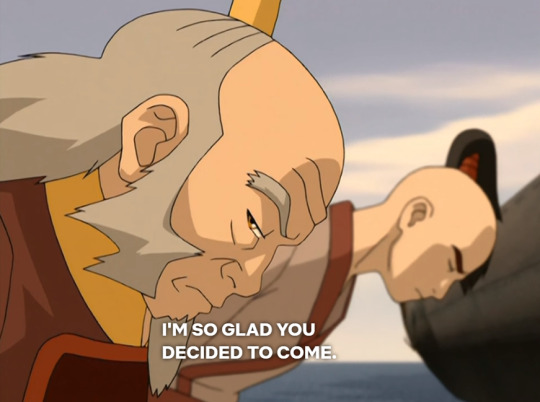
They both receive the same invitation to join the others, to go Home, to go to Heaven, even though the main focus is on Aziraphale and Zuko. The parallels diverge with these two, however: while Azula doesn't really care whether or not her uncle joins them, as long as she gets Zuko, Crowley was never meant to accept the offer. The Metatron draws Aziraphale away from Crowley to talk, they are separated as soon as possible, and a wedge driven between them.
At first, Iroh wasn't going to go, but changed his mind at the last minute. Crowley does not change his mind.
With how similar these two scenes are, I can't help but speculate on what this means for Good Omens. Is this just an elaborate way of kidnapping Aziraphale? Are the angels taking pointers from their last attempt and taking a more subtle, calculated approach this time?
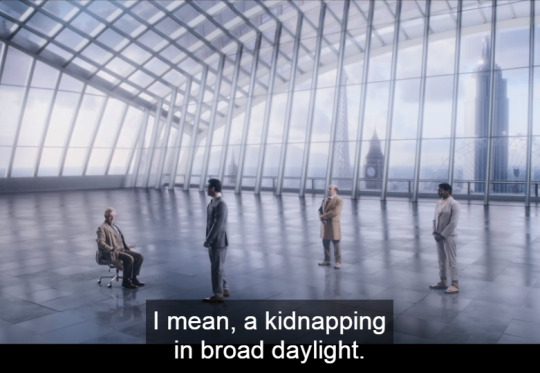
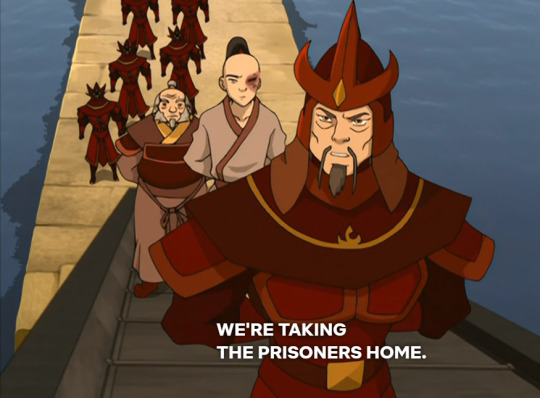
Do they actually want Aziraphale on their side or are they just trying to get him out of the way?
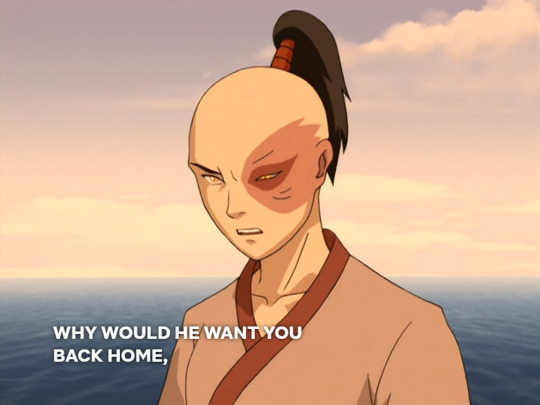
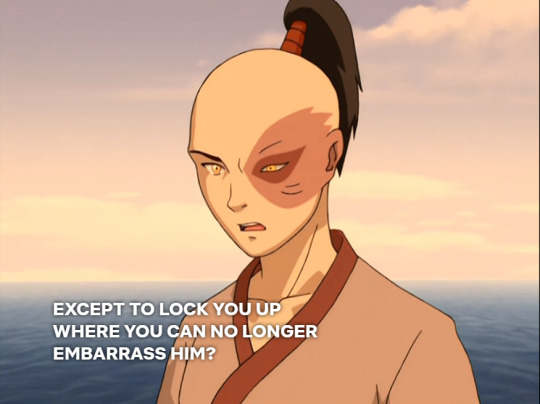
#good omens#good omens season two#good omens s2#avatar the last airbender#analysis#long post#yes hi#i'm coming in with the spicy hot take that heaven is the fire nation#i will not be taking any criticism at this time#they way some of the screenshots have the same framing between the two shows makes me really happy for some reason#it's late and i need to go to bed but i hope this makes sense#holds up the two scenes#they're the same picture#go2#good omens season 2#good omens spoilers
226 notes
·
View notes
Text
Metapost: "The Ascendent"
**this is a meta for my fic, Pieces Still Stuck in Your Teeth, and NOT a discussion of the BG3 game canon in any way. If you try and make this into a disk-horse, I will BITE you**
(spoilers under the cut for Chapters 1-23 of Pieces Still Stuck in Your Teeth).
So... remember in the Chapter One endnote when I said I was a Spike/Buffy fan first, and a person second? x
・゚: ✧・゚: ・゚: ✧・゚:・゚✧:・゚・゚✧:・゚
In more seriousness, there was a number of fictional seasonings/ingredients that went into creating what I felt was the villain of a Gothic horror, and what I felt could turn the Ascendent into something that was both 'fixable', and something I enjoyed writing.
Those ingredients were:
Spike and the idea of 'soulless' vampires in the BtVS canon - do I like this conceit of BtVS worldbuilding and how it's used in the show? No. I think it often underlines how bad Whedon is at writing romance. BUT I do think it gives Buffy this free pass for which vampires she can/can't like or adopt, and I needed some of that for my protagonist. I need a 'I can fix him' moment - BtVS has those in fucking SPADES.
Howl's Moving Castle (this one was accidental, I'm still mad at myself but I can't deny it's there) - man conducts magic ritual for power, removing an essential part of himself in the process that needs to be returned
Picture of Dorian Gray (the idea of an exterior staying pristine while something hidden suffers and decays)
Curse of Strahd (the soulless in Barovia, which I mentioned in Chapter 23)
The idea of default moral alignments in D&D. I have a whole chapter arguing against this in my thesis (mostly bc it's often applied to entire races) but I was fascinated by creating a set of circumstances where I feel like a default moral alignment is valid, actually. 7,000 deaths seems like a good set up. I wanted to imagine a being that was trapped within a default moral alignment, and the laws of its very being prevent it from being good no matter what it tries, and it knows that (this kind of creates a feedback loop with the Spike/Buffy stuff)
The parts of the BG3 canon I took and REMADE (I'm stressing this throughout, I was making a horror story and a horror monster your honour):
Astarion conducts the Rite of Profane Ascension with scars on his back, but has to scar Cazador's back personally, suggesting that um... the Rite REALLY SHOULDN'T BE CONDUCTED BY SOMEONE WHO'S GOT THOSE SCARS. Cazador wasn't going to do it that way, is all I'm saying!!
The idea that Ascended!Ending Astarion is a concentrated version of certain traits that have persisted throughout his story - his flirtiness, his understanding of sex as a mechanism and expression of power, his use of a façade as a mask for trauma he refuses to acknowledge.
The lines alluding to dissociation in the brothel foursome, post-Ascension.
The idea that Astarion seduced Tav to survive or protect himself- in my case, because I made the Ascendent empty save for Astarion's survival instinct, the idea that he would gravitate towards Tav as one of his default modes to potentially survive made sense to me - this is why it becomes an obsession.
・゚: ✧・゚: ・゚: ✧・゚:・゚✧:・゚・゚✧:・゚
For me, when writing, the Ascendent is a few things:
An intensification of vampirism in a different, fucked-up direction. Yeah, A!Astarion, you can walk in sunlight and you can eat and drink and don't need blood. But you are still a hungering maw of emptiness that feels like it will never be whole or close and connected to the living - just now in a wildly different, metaphysical/existential direction! Welcome to depression, alienation, and otherness!
A soulless being, that knows it is soulless - that initially was very happy with its life but then as the years passed, increasingly spends its every waking moment knowing there is something innately wrong with it that it can't seem to shake, no matter how much it engages with life and all the pleasures of life. (see the 'every meal without savour' speech)
A magically literal metaphor for Astarion's dissociation in moments of extreme trauma, up to and including the fight with Cazador - essentially, the moments when there is nothing but a performance or an exterior, because the self/soul are suffering and they cant' come to phone right now
Astarion's survival instinct. As I say in Chapter 23 - Mephistopheles thinks it is an empty body, who's performance is trying to deny the reality of it's own existence. Rosalie, who has a bit more understanding of Astarion, sees that the performance is not just a coping mechanism but one of Astarion's main modes of survival. The Ascendent is Astarion's survival instinct/techniques for endurance, without any soul or person behind them to protect. This is how I tried to tie in the flirty, hypersexual persona and wrap it with a bow.
I wanted a monster that was undeniably scary, and monstrous to me (oh? you can't fit in or be happy no matter what you do and no matter how hard you try, and you think there's something intrinsically off? how's that autism diagnosis going Emma) but that I also felt sympathy and true sorrow for. I needed to have motivations for him chasing after Tav that I could write meaningfully from and sympathise with.
Not only has Astarion used Tav as a life-raft once before, they've also proven to be the most secure thing he's ever clung to. Of course a rabid survival instinct Astarion would become obsessed, and see them as a potential solution to the problem (this was then intensified by Rosalie also being a walking, overbearing moral compass, and having bound him in a contract in the first week of living, accidentally - a lawful good immoveable objects meets a default moral alignment unstoppable force.)
...Because I also wanted that moral alignment spice!! Wizards of the Coast, default moral alignment is fucked up actually!!! Imagine something trying so desperately to be good - literally being bound in a pact and having been told to be good - but the laws of the universe and its very essence are like "nah mate, we kind of want to destroy and annihilate everything, we're neutral evil personified". That's scary!! that's fucked up!! that's what a birth from 7000 deaths gets you!!!
・゚: ✧・゚: ・゚: ✧・゚:・゚✧:・゚・゚✧
So, now for the actual timeline, for people who aren't interested in my silly musings but mostly just want answers lmfao.
Rosalie makes the decision not to intervene in Cazador's mansion, making it seem like she'll support whatever decision Astarion will make there.
Rite of Profane Ascension happens. Astarion conducts the ritual, rips his own soul from his body, the Ascendent is born with literally zero context. Mephistopheles is fucked in Cania, because a bunch of stuff has just gone wrong.
(oh, by the way, the Ascendent knows Infernal as a default language. Bc it's born from an Infernal rite.)
The Ascendent is now default neutral evil, and feeling some kind of way. Rosalie and him break up. He's supposed to have everything, but the one thing he thought was a done deal - his most stalwart suppporter - just rejected him.
Netherbrain defeat (the Ascendent is not invited. Imagine being an all-powerful, hypersexual survival instinct vampire, and your ex-girlfriend neither wants you for sex, nor your power.)
Rosalie accidentally binds the Ascendent (a soulless devil) in a pact demanding that he never kill anyone, when that's literally what the Ascendent's new existence/new default moral alignment is driving him to do. Then, she fucks off and goes into hiding.
Well. The Ascendent can just get another wizard, to help him learn all of Cazador's secrets to cope [Hemlock is recruited].
The years go by! The Ascendent is doing sooooo well. Everything is great, guys! I'm rich, I'm beautiful, I have lavish parties and lots of sex - why do I feel nothing? I'm a vampire perfected - I have no hunger for blood, I can walk in the sun, I can enjoy all the freedoms of a living, breathing man - why do I feel like I'm starving? Why does everything turn to ashes in my mouth? I have friends - oops, I've sabotaged all those friendships with my innate neutral evil destruction. Why can't I feel anything? What's wrong with me? I'm doing everything right? Why doesn't it feel that way?
Also, I can't kill anything to feel better about it, because my hidden ex-girlfriend bound me in a pact.
In this time, to reflect the gradual degradation of the Ascendent's happiness and it's increasing awareness that it is something Other and innately wrong, the reflection starts going weird. Starts going strange. Starts getting a bit fucked up. Almost as if, when he looks in the mirror and sees a person, *nothing* should be what's there. Imagine being a spawn who couldn't see your reflection, and then a vampire who could see it's reflection, but knows that they're innately empty. Knows there's nothing there. I'd freak out a little bit about it as well tbh, I'd go a bit tooth and claw and elongated jaw about it.
The Ascendent finally admits that's there must be something kinda fucked about it. Life just ain't working out, lads. He starts looking for any and all impossible cures that will help with the malaise in his soul (and that innate essence problem, caused by default moral alignment). These include: more bad decisions, such as a house in Cania bc the Ascendent is hoping he'll feel more at home with devils than he does with mortals. All it does is make him feel more isolated and alone.
But eventually, he settles on two things! - Wish (Hemlock's idea), and Rosalie (the Ascendent's idea). Clearly, we just need Rosalie back! Her leaving is actually what fucked him up in the first place - none of this existential bullshit! She fixed us one, she can fix us again.
But looking for Rosalie hasn't worked out. In order to get a shot at her, the Ascendent goes and bargains for his own soul from Mephistopheles. Mephistopheles, adding a new sheet in excel titled 'what the fuck happens when i give this soulless monster a soul to play with?', agrees and starts tracking his new data.
Obviously, just putting the soul back in yourself will fix you. But the Ascendent, the nothingness living inside Astarion's body, will die. Taking the soul back would erase itself. The Ascendent - who is survival instinct personified - would never do this.
So instead, it starts interviewing and cannibalising the soul. Bc a soul is what it needs, this is the closest it's ever felt to being alive. Bc it's made this all about Rosalie, he thinks he's found his solution. The chase is making him feel alive again. It's true love, lads! not the soul.
Wish auction happens - the Ascendent is beaten to the punch by some unknown (hot) wizard.
This avenue cut off, the Ascendent makes the decision to try and win Rosalie back.
Astarion advises that to make her come back to the Gate, he should murder a bunch of people. Because this comes from the soul, not the soulless devil nothingness, it circumvents the pact.
...The events of Pieces begin!
・゚: ✧・゚: ・゚: ✧・゚:・゚✧:・゚・゚✧
And finally - the Ascendent tries to destroy Jar!Starion for many reasons in Chapter 19:
The Ascendent knows that it dies, if the soul and the body get reunited (or is that constant high alert survival instinct just no longer needed, because the problem is fixed? you decide.)
The Ascendent values Tav above itself. Tav is going to fix them. Astarion believes he could never fix himself.
Dissociation - that soul isn't me. I'm here, looking at my soul. If I get too close, it'll kill me.
Self-hatred - that soul isn't me. That man made a mistake, and I've had to live with the consequences. He doesn't deserve to live, for what he's made me become.
The knowledge that Rosalie/Tav will only ever want that version of him, not the one that's living and breathing, that sees itself as the most wretched, fucked-up version of itself. So... give them no choice. They have to deal with me and love me at my worst.
And if the Rite didn't work - if the version of the Ascendent walking around isn't the best one, and the one people want... what was it all for? Why does the Ascendent feel like this? Why does it have to suffer?
・゚: ✧・゚: ・゚: ✧・゚:・゚✧:・゚・゚✧
....And, that's my little meta post! If anyone has any questions about the timeline or any motivations at any points in the fic, I'm obviously more than happy to explain things via ask/comment, as always!
TLDR: I just wanted to make a Gothic horror. I wanted a dark romance, fucked up obsession vampire/mortal dynamic, but I also wanted a situation that was scary for both Astarion and my Tav. I personally think an Astarion who is so dissociated and separate from reality that he feels that in his bones daily, is scary. It's the lingering impact of the traumas the Rite and those 7,000 souls embodied.
I was literally just trying to make it a horror, for everyone involved.
#metaposts#long posts#my writing#wip: pieces still stuck in your teeth#spoilers!#i've never really explained my writing process before in this depth so... I hope it makes sense!#writing meta
82 notes
·
View notes
Text
reblog and tag prev as what pokémon you mentally associate with them, regardless of ‘sonas, and maybe explain why! :)
#I haven’t really dabbled in posts like this much but we’ll see where this goes :)#I kind of picture fujii as a lilligant for some reason#but I know your ‘sona is a tinkaton#I also get Phantump vibes from Sofie#hope this makes sense😅#pokemon#pokémon#tag games#reblog games#EDIT: I’ve gotten a little confused so please forgive me for responding to the wrong ones haha#reblogs are a little difficult for me to follow😭
138 notes
·
View notes
Text
I've been thinking a lot about the one-dimensional kinda fandom interpretations of Dazai and Chuuya in particular - the overemphasis on Dazai's weird brand of mischief/manipulation and Chuuya's anger and tendency to lash out and how it's not like these traits are... wrong, per se - these are their surface level/immediately notable characteristics - it's just that it misses the nuance as to why these traits likely exist.
What these interpretations don't fully capture is their very similar cores deep down - two people plagued by feelings of alienation, human inadequacy and repeated loss. Despite starting from these very similar places, they both dealt with the issue in near opposite ways. Dazai numbed himself to pain (remember: he hates pain! I cannot emphasize this enough!) and rarely gets close to anyone for fear he will lose them - his loss led to apathy, a withdrawal from humanity, a fear that he will always be empty inside - his ability: No Longer Human. Chuuya, on the other hand, refuses to numb himself and instead feels every single emotion in full and values his bonds with others over anything. He wants to belong and makes efforts to be perceived as a part of his group. Underlying this, however, is a kind of tired grief paired with resilience - remember that his ability is Upon the Tainted Sorrow. Not anger, or rage.
Sorrow is what results from this kind of heavy identity crisis and loss - for both of them. Think of Odasaku's read on Dazai as someone who looked close to tears when "acting" in front of the sniper poised to shoot him, describing him to Gide as a too-smart child left in the dark, or the way Stormbringer constantly reminds us that Chuuya is 16 and the desperation he feels in the scene where he holds his own dying clone, unable to help him.
Both characters carry a melancholy, resulting from their respective issues with their own humanity - I know I'm not the first one to comment on how their abilities could just as easily be referring to each other as well as themselves. This reads as very intentional to me - much like Atsushi's story begins as a clear parallel to the short story Rashoumon and Akutagawa sometimes being referred to in more beast-like terms than man, it makes sense that Dazai and Chuuya would reference each other in a similar vein.
And if that was the end of it, then we would expect that deep sorrow to shine through in both characters, but it rarely does except in pivotal moments. That's because the both of them have had to constantly deal with external threats - they believe they cannot afford to show vulnerability.
So, what you get instead is Dazai taking a kind of twisted ownership over his inhumanity and using it to make people afraid of him and to control everything so that he is never blindsided and hurt again, in the process, further alienating himself and making his issues worse. He inflicts fear so he doesn't have to be afraid. He can relax and be as silly as he wants - so long as everything around him is completely according to his predictions. There's a bonus to his foolish demeanour as well: hardly anyone can read him well enough to get close.
Then you get Chuuya, who feels so strongly and so much that it has no choice but to boil over, and due to never being able to or feeling comfortable with being anything but "the strongest", he hides moments when he is touched, or worried, or grieving, with anger and violence and defensiveness. As such, he is always seen as more weapon than person, a cut above the rest, forever standing out to others no matter how much he tries to integrate. The closest he came to true belonging was wrenched away from him before he could have a chance to know what that would actually feel like with the death of the Flags.
These surface traits are defense mechanisms. And the amusing thing to me is that likely means these two would love if that's all most people ever saw of them. (Of course, they clearly do want to be seen and accepted, but defense mechanisms become automatic over time because they often feel much safer. Likely another reason they clash so much - they see each other, and it is deeply uncomfortable for them both.)
So, you have Dazai defending himself with his two-faced nature, making jokes and/or manipulating everyone in the vicinity, and Chuuya defending himself with intimidation and anger, never letting any vulnerability show through because anger is easier but at the core of all of this is that loss and that grief and the sorrow and fear that pervades from it.
#they both really said 'do not perceive me' lol#i know i'm kinda stating the obvious here but eh#it was fun to write out#also quick note#i don't have the novels on me so i'm relying on memory#if i've misremembered something please let me know and i'll fix it - just be polite!#bsd#bsd dazai#bsd chuuya#soukoku#skk#storyrambles#actually does this even make sense?#lol i hope it does#bsd meta#bsd analysis#ugh i've read this over like five times i'm just gonna post it now
1K notes
·
View notes
Text
Ok so I decided I am going to post that “atla live action hot take” I mentioned
Click below the cut if you’re interested in hearing my take on the whole “taking away sokka’s sexism” thing
1) nobody is glorifying sokka’s sexism by saying it should be kept in the show. It’s quite literally the opposite. The original series did a great job using his sexism as a lesson; any time sokka made a sexist remark in the first 4 episodes it was made abundantly clear that he was wrong, and as soon as Sokka was proven wrong he admitted that he was misguided, apologized, quite literally bowed down on his knees to ask for forgiveness, and even asked to learn from the kiyoshi warriors, and excepted wearing their traditional uniforms, further surrendering his flawed perspective of societal gender roles. A wonderfully executed example of writers using their characters to teach viewers a lesson: which was, in this case, that sexism is wrong. Sokka’s sexism was not left unresolved, so why take away a valuable lesson in the show??
2) if you take away a character’s flaws…then they don’t have development. A character can’t learn and grow from their mistakes if they never make mistakes.
If a charecter starts off perfect and unflawed then they are surface level and lack depth or the ability for an arc.
And no, this is not saying that Sokka didn’t have many other admirable qualities like his intelligence and adaptability etc.. He 100% had those qualities. But one of the coolest things about the original atla series was their ability to flesh out side charecters and give them depth. A charecter who is simply smart then becomes smarter, or adaptable then becomes even more adaptable, lacks depth and internal conflict.
Sokka’s sexism was the starting point for his internal conflict. Sokka wasn’t just sexist to be sexist, or because the entire southern water tribe was misogynistic (and we know for a fact they weren’t, because if they were misogynistic, then Katara wouldn’t have been shocked when the North denied her waterbending training). He was misogynistic because being seen/accepted as a “man” and a strong warrior was all Sokka wanted after his father left him behind. In reality, we know his father was only trying to protect his son from the horrors of war. But to a young and impressionable child, Sokka internalized this as him not being “man” enough, so he dedicated himself to becoming the person he thought would make his father proud. He was always reaching for this unattainable standard he set for himself, which lead to him having a skewed and toxic view of masculinity that he took out on the women around him. He associated being a worthy warrior with being a traditionally masculine man, and leaned way too far into fulfilling the gender roles men and women are told to play in society in hopes of gaining his father’s approval. We see him do this by suppressing his feelings of inferiority as a nonbender, along with all the aspects of himself that he thought could be seen as “weak” or “feminine” (ex: his love for shopping and poetry and art that we see develop up until the literal end of the series).
So clearly, the vast majority of sokka’s charecter development that deals with internal conflict stems from the toxic view of masculinity and gender roles that he adopted after being left behind by his father, which caused him to outwardly lash out toward katara and Suki with misogynist comments. So taking away the sexism we see in the first few episodes eliminates important context that makes sokka’s character development throughout the entire series significant, not just an “iffy unnecessarily bigoted message”, because it was quite literally used to show that sexism was wrong.
I wasn’t going to say anything about this at first but seeing so many people display a fundamental lack of understanding for the premise of character development and the usage of charecter flaws to promote positive messages in media set me off. Just…WTF????
(Also I know I wrote a summarized version of this in the tags for another post but I wanted to expand upon it more and make this a separate post)
#does this make sense??#it ended up being very wordy so I hope the point still came across#but like. this is a topic that I’m very passionate about and I hate seeing people miss Sokka’s entire internal character arc#sokka#atla#atla live action#avatar#sokka appreciation hours#I think that’s the tag I use for this stuff?#if one person says ‘it’s not that deep’ I’m gonna lose it#not really lmao#my post#headcanons and stuff#avatar the last airbender#Netflix#avatar netflix#atla net
144 notes
·
View notes